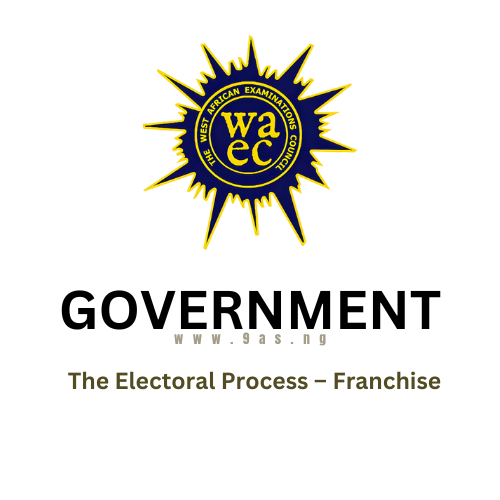THEORY
1. Identify three factors that can disqualify a person from voting in a democracy.
OBJECTIVES
1. Franchise means the
A. ability to conduct elections.
B. body of principles governing the conduct of an election.
C. right to participate in an election.
D. right granted to French citizens to vote.
2. Universal Adult Suffrage is associated with a
A. democratic government.
B. military government.
C. gerontocratic government.
D. fascist government.
3. Restricted franchise violates the idea of
A. political equality.
B. political culture.
C. public accountability.
D. political socialization.
4. Universal adult suffrage is very popular today because it
A. allows the establishment of military regimes.
B. allows for equal political representation.
C. encourages a multi-party system.
D. allows for greater political participation.
5. Any type of restricted franchise is a violation of principle of
A. constitutionalism.
B. sovereignty.
C. political equality.
D. popular election.
6. The process of depriving persons of the right of voting is known as
A. enfranchisement.
B. disqualification.
C. dismissal.
D. disenfranchisement.
7. Franchise means the right of all qualified citizens to
A. manipulate election results.
B. conduct elections.
C. enforce electoral laws.
D. vote and be voted for.
8. Franchise can be described as the political right to
A. vote during elections.
B. contest elections.
C. belong to political parties.
D. vote and be voted for.
9. grant of the right to vote is called
A. enfranchisement.
B. disqualification.
C. prohibition.
D. participation.
10. Citizens who are legally qualified to vote form
A. political parties.
B. Trade Union Congress.
C. members of the House of Assembly.
D. the electorate.
11. Suffrage is also known as
A. franchise.
B. plebiscite.
C. public opinion.
D. electoral college.
12. Disenfranchisement means
A. right to vote and be voted for.
B. right to form government.
C. to be disqualified from voting.
D. disallowing free and fair elections.
13. In limited franchise, restriction on voting can be based on
A. Height.
B. Property.
C. strength.
D. exposure.
14. Which of the following is a limitation to Universal Adult Suffrage?
A. Wealth.
B. Age.
C. Race.
D. Sex.
15. In a democracy, franchise is given to all
A. qualified adult citizens.
B. loyal party members.
C. citizens except members of the armed forces.
D. citizens.
16. Universal Adult Suffrage is popular because it
A. allows for equal political representation.
B. allows for greater political participation.
C. encourages a multi-party system.
D. ensures equal performance of all political parties.
17. A country in which all qualified citizens vote is said to operate
A. universal suffrage.
B. a universal adult suffrage.
C. a universal male suffrage.
D. an unlimited suffrage.
18. The right of the citizens to vote and be voted for in an election is called
A. indirect election.
B. nomination.
C. general election.
D. franchise.
19. Franchise is the right to
A. express political views.
B. control the government.
C. vote and be voted for.
D. ensure good governance.
20. A person who exercises franchise performs
A. an executive function.
B. a legal function.
C. a civic duty.
D. an administrative duty.
21. Universal adult suffrage means that only
A. the wealthy class is allowed to contest elections.
B. the educated class is allowed to vote.
C. eligible adults are allowed to vote and be voted for.
D. women are allowed to vote and be voted for.
22. Disenfranchisement refers to the
A. qualification of voters in an election.
B. disqualification of fraudulent presidential aspirants.
C. denial of right to vote in an election.
D. right to vote in all elections.
23. Universal Adult Suffrage is an indispensable factor in the practice of
A. constitutionalism.
B. socialism.
C. democracy.
D. oligarchy.
24. Universal adult suffrage was first adopted throughout Nigeria under the constitution
A. 1922.
B. 1946.
C. 1958.
D. 1979.
25. who are legally qualified to vote form
A. a constituency.
B. the executive council.
C. the House of Assembly.
D. the electorate.
26. Franchise owes its evolution to the
A. development of representative government.
B. establishment of state enterprise.
C. development of the cabinet.
D. establishment of electoral commission.
27. Which of the following factors limits universal adult suffrage?
A. wealth.
B. age.
C. education.
D. heredity.
28. Which of the following best describes the concept of enfranchisement? Right
A. to campaign for candidates during elections.
B. to sue and be sued.
C. given to people to vote and be voted for.
D. to free expression on political issues.
29. On which of the following grounds can a citizen abstain from voting
A. Religion.
B. Education.
C. Wealth.
D. Status.
30. Who among the following is not eligible to vote?
A. Civil servant.
B. Retired soldier.
C. Certified bankrupt.
D. Chief magistrate.
31. The electorate is defined as
A. intended candidates for voting
B. elected party members
C. elected civil society group
D. citizens that are qualified to vote.
32. Any type of restricted franchise is a violation of the principle of
A. constitutionalism.
B. sovereignty.
C. political equality.
D. popular election.



